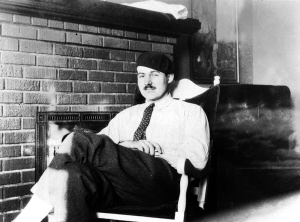By John Bocskay
Any American or Canadian who has been to a Costco in Korea has witnessed what Koreans do with the onions. In the U.S. you turn the crank on the dispenser and catch the tumbling onions on the hot dog, the whole hot dog, and nothing but the hot dog, but that’s not how the Koreans roll. Most of them pile the onions on a dish or a patch of foil, dump globs of ketchup and mustard over them, mix it all into a lumpy orangey mash, and tuck straight into it with fork and spoon as an improvised side dish to their pizza, clam chowder, or Caesar salad.
Expat critics react with a mix of condescension, bemusement, derision, and disgust. Didn’t Koreans get 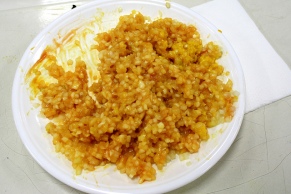 the memo? Onions are supposed to go on the hot dogs! And look how many onions they’re piling on! Have they no shame?
the memo? Onions are supposed to go on the hot dogs! And look how many onions they’re piling on! Have they no shame?
Among the many unfair and uncharitable assessments of this practice, perhaps the most ironic and ridiculous is the notion that Korean shoppers are taking advantage of the generosity of Costco, a fantasy that would have us imagine Costco to be a defenseless multinational corporation which is either unaware that their staff are refilling the onion dispensers 30 times a day on weekends (I asked) or are somehow powerless to stop this hemorrhaging of onions; a fantasy which depends for its dramatic tension on the belief that despite giving away samples of ribeye steak, shrimp, wine, pork cutlets, sausage, noodles, cookies and dozens of other items every day at stations all over the store, the thing that’s going to finally bust them and ruin the party for everyone is the unfortunate habit of doling out a few sacks of one of the cheapest vegetables on the planet.
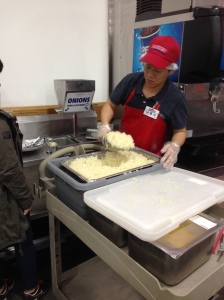
The onion guy fills it up for Nth time.
If that argument sounds lame, you may find yourself suspecting, as I do, that what’s more likely happening is that Costco Korea has lucked into an inadvertent but tolerable solution to their lack of side dishes in a country that everywhere expects them, and that management has decided to run with it as long as it doesn’t lose too much money.
A recent e-mail exchange with Edward Yoon Kim, the General Merchandise Manager for Costco Korea confirmed my hunch. Noting that the company believes that “real success comes from real member satisfaction,” Mr. Kim explained that as long as Costco can make a “reasonable profit” while making customers happy they would continue offering free onions, and that if it was no longer profitable to do so they would consider stopping it. Since the onion salad buffet has been going strong for several years, it seems safe to call it something other than abuse.
There’s a lot about these criticisms that has always struck me as strange. The first thing you might notice at Costco is that there is nothing posted on the onion dispenser itself to indicate that the onions are supposed to go on hot dogs or that they are not intended as a side dish. In other words, there was no ‘memo’ that Korean customers are not getting, and the habit that our worldly Western critic imagines to be a self-evident universal truth turns out to be nothing more than his own narrow cultural conditioning.
Nor is there anything intrinsic to the onion dispenser to suggest that the culturally-conditioned way that Americans use it – cranking steadily with one hand while catching an uneven flow of onions atop a narrow moving target with the other hand – is even the best way to use it. In the 20 minutes that I observed people serving 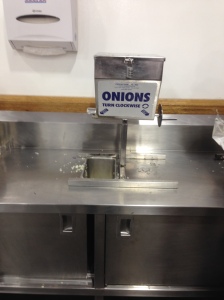 themselves onions on a recent Saturday afternoon, the only people who dropped onions onto the counter – apart from the one little kid who cranked it for fun until his mom told him to cut the shit – were the ones who used it the “right” way. Not surprisingly, nobody who used a dish to catch onions managed to miss any.
themselves onions on a recent Saturday afternoon, the only people who dropped onions onto the counter – apart from the one little kid who cranked it for fun until his mom told him to cut the shit – were the ones who used it the “right” way. Not surprisingly, nobody who used a dish to catch onions managed to miss any.
Ditto for the ketchup and mustard, which is actually harder to dispense directly onto a hot dog than the onions are, for the same reasons (uneven flow, occasional spurts, moving target, etc.), but with the added challenge of the changing distance of the hot dog to the spigot as it is pumped downward. Catching the condiments on a dish and mixing them later makes it easy and actually gives you a shot at recreating the model hot dog in the promotional photo above the food court, or failing that, just not making a total mess.
I also watched people eat for a while, and I noted that a quarter of the people (7 out of 28) who took onions were actually using them in the intended way: as a topping for hot dogs. I realized then that mixing the onions with the condiments beforehand and spreading them on as a sticky mixture made them less likely to tumble out when you bite into the dog. I also observed another 7 people put the onions on bulgogi bakes, which I mentally noted as something I definitely had to try later.
The rest treated the onions exactly the same way Koreans treat them everywhere else: as a side dish, and in order to understand that, you need posit nothing stranger or more terrible than a small cluster of reasonable assumptions based on long-standing cultural practice.
The more I think about the Costco onion salad, the tougher question for me to answer is not why Koreans do it or why Costco allows it, but why Westerners almost never see it as innovation or a clever adaptation and instead tend to paint it as a failed attempt at cultural appropriation. And it’s a very selective tendency. Chop up a hot dog into pieces so that the family can share it and you have a charming example of Korean togetherness; but eat onions from a dish with mustard and you’re a culturally-confounded freeloader. Bump into someone in a traditional market and it’s an instantly forgettable part of the rough-and-tumble charm of the old Asia, but nudge someone with a shopping cart at an American supermarket chain and you’re destined to be the clueless antagonist in an upcoming facebook rant or K-blog screed.
I’ve long suspected that the reason we think like this (I confess to it as well) is that when you go to a place like Costco you feel you are stepping into a piece of America, so you consciously or unconsciously feel that the same norms apply. When they don’t, it’s more jarring than if the setting had been radically different and had carried no such expectations. This may be why it often seems that the hardest things for Western expats to accept are ironically not the things that are most different from our home countries but the things that are most similar. We enjoy the mad rush of a tuk-tuk ride through Bangkok’s shifty alleys yet curse the Korean driver who fails to indicate a lane change on Seoul’s modern roads. Being nudged at a street food cart is a minor annoyance, but cutting the line at a Busan Burger King inspires an aggrieved lecture. Shoot soju on a raised wooden platform in front of a bodega and you channel old-world insouciance; do the same thing on a new sidewalk and you’re an obstacle. A savage. An idiot.

Re-purposing familiar devices is often considered clever.
It’s fun to point out cultural quirks and oddities, but it’s ironic that the cultural heirs of Thomas Edison and the Wright brothers so often insist that Koreans should think inside the box and see onion dispensers as having only one conceivable use. You can learn something about familiar things by observing how they are used by people who have no culturally conditioned ways of using them – there’s a whole genre of internet memes which fascinates millions of people for precisely this reason. It’s weird that we applaud the ingenuity of the American yokel who figured out that he can use toothpaste to clean the headlights of his pickup truck, and we dignify his achievement with the label “life hack”; but when some anonymous Korean shopper figured out that catching condiments on a dish was actually a decent idea, or that mixing them together would result in a dish that millions of people apparently enjoy, we deride it as a cultural hack job.
Perhaps the final irony is that if we insist on being purists and on recreating ethnic dishes either authentically or not at all, then we’re simply being difficult, but the more immediate problem with that is that a lot of my favorite foods – General Tso’s Chicken and New York-style pizza come to mind – would never have been created in the first place. You’d also have to say goodbye to  the American hot dog, which is itself a bastardization of European sausage that could not have held onions at all if Americans hadn’t added the bun. When you really get down to unpeeling the layers of assumptions surrounding the Costco onion salad, it becomes hard to know which is piled higher: the onions, or the irony.
the American hot dog, which is itself a bastardization of European sausage that could not have held onions at all if Americans hadn’t added the bun. When you really get down to unpeeling the layers of assumptions surrounding the Costco onion salad, it becomes hard to know which is piled higher: the onions, or the irony.
The only real question remaining for me concerning the onion salad is, “How does it taste?” so in the interest of the advancement of knowledge I tried it. I admit to feeling a pang of vestigial guilt when I piled the onions on my plate, plopped some mustard and ketchup down next to it, and swirled it all together. I’ll also be the first to admit that the resulting mixture really does look gross, perhaps because it bears an uncomfortable resemblance to the fake plastic vomit that was sold in the backs of comic books when I was kid.
Once I got past that, however, I found the onion salad to be surprisingly bland, not nearly as tart as I expected, but my curiosity was still only half satisfied. Fulfilling an earlier promise to myself, I cut open a bulgogi bake, loaded the onion salad on top and had a genuine Eureka moment as the flavors hit me: the combination of the breaded crust, marinated beef, cheese, onions, mustard, and ketchup transformed the ho-hum bulgogi bake into a very respectable cheeseburger, and I assume, fair reader, that you don’t need me to tell you exactly how weird and terrible that was.
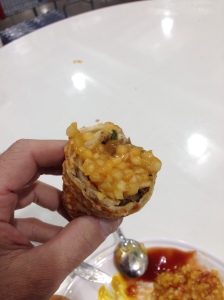
Boom!


